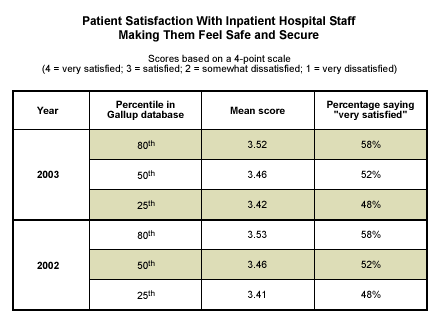In 1999, the Institute of Medicine (IOM) shocked the nation with its report, To Err Is Human, which estimated that up to 98,000 people die because of medical errors each year. Has the healthcare field improved its performance in the five years since the IOM report?
In October 2003, an article in the American Medical News reported that many experts believe little progress has been made. Dr. Lucian Leape, adjunct professor of health policy at the Harvard School of Public Health, was quoted as saying hospitals have a long way to go in curing patient safety problems: "It is not enough and it is not fast enough …We haven't gotten the patient safety movement in high gear yet. What bothers me is how hospital and medical leadership are dragging their feet."
What Are Hospital Patients Saying About Safety?
How do hospital patients feel about their own safety? Gallup's 2002 and 2003 healthcare databases include ratings from more than 290,000 patients at more than 400 hospitals on how satisfied they are with the staff making them feel safe and secure.

Despite all the publicity about medical errors over the past few years, patient ratings of how safe their hospital made them feel did not change between 2002 and 2003. And those perceptions are not especially positive. Looking at the 50th percentile of the database, mean scores (based on a scale of 1 to 4, in which 4 = "very satisfied") for patient ratings of safety and security (3.46 in both 2002 and 2003) fall below mean scores for overall inpatient satisfaction (3.50 in 2002 and 3.51 in 2003).
Mean scores can be difficult to interpret. Another way to analyze the results is to look at the percentage of patients who said they are "very satisfied" with the staff's ability to make them feel safe and secure. Even at "best-practice" facilities (hospitals scoring in the 80th percentile of the database), only 58% of patients are "very satisfied" on this measure. At 25th percentile facilities, less than half (48%) of patients report being very satisfied that staff members make them feel safe and secure.
Bottom Line
Admittedly, feeling safe and secure in the hospital can include factors beyond confidence in caregivers' abilities to prevent medical errors. Open-ended follow-up on this question reveals that patients are not only concerned about medical errors, but also about their personal safety from crime. It can also be argued that patients may not even notice or understand many medical errors that could occur, obscuring patients' abilities to realistically assess their actual safety and security while in the hospital.
Accepting these limitations to using patient perceptions of safety and security as a measure of medical errors, what can we conclude? First, despite all the publicity surrounding the IOM report five years ago and hospitals' efforts to respond, patient perceptions of quality on this aspect of care haven't changed in the last two years. Second, ample room for improvement exists for all hospitals -- even those defined as "best-practice" institutions.